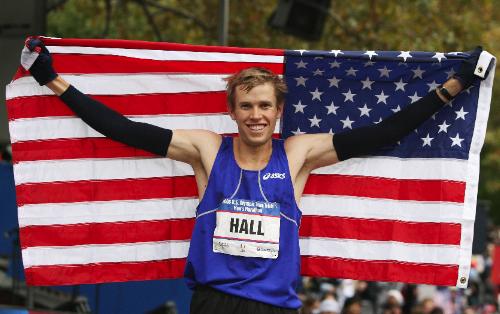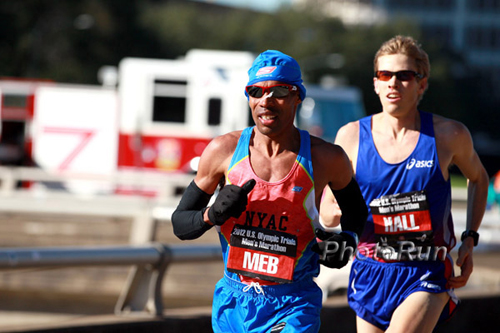What will U.S. Olympic Marathon Team look like? We’ll know for sure in a few short weeks, but one thing for certain is America’s fastest marathoner Ryan Hall won’t be on this team.
At 33, Hall, who ran 2:04:58 at Boston in 2011, announced his retirement recently, citing extreme fatigue and chronically low testosterone levels. This is a sad state of affairs since Hall should actually be reaching the prime of his career at his age.

His retirement begs an even bigger question: Why has it been decades since an American marathoner has won gold, or even any medal?
In 1972, Frank Shorter won gold in his birthplace of Munich. American Meb Keflezighi, born in Eritrea, got silver at the 2004 Olympic marathon. For the women, Joan Benoit won gold in 1984.
One problem is that marathon training has become more like boxing or karate — injuries and ill health knock down some of the greatest. Like Alberto Salazar before him, among other American great runners, Hall has simply run his body down too much.
Injuries and ill health should not be part of the game of running, but they are. We are not destined to be hurt — there is no injury gene. In short, the problem is that too many runners are fit but unhealthy. Even those fit enough to qualify for the Olympic trials are unhealthy. Poor health, however, comes in physical, biochemical and mental-emotional forms — whether a knee or foot injury, hormone imbalance or even a heart attack.
The problem is complex, but is typically related to overtraining. It also can be due to poor diet and nutrition, and often bad footwear choices. The result is not only spiraling performances — it also can be deadly.
At the 2008 U.S. Olympic marathon trials, Ryan Shay, one of America’s best runners at age 28, collapsed and died about five miles into the race. Shay’s irregular heartbeat stemmed from an abnormally enlarged and scarred heart. He was not the first marathoner to die during a race. The incidence of athletes dying suddenly of heart disease is about the same as that of the rest of the population. Running guru Jim Fixx, who, along with Shorter, helped trigger the running boom in the 1970s, also died of a heart attack near the finish of a training run in 1984.
Injuries in a non-contact sport like running are mostly preventable. More than helping an athlete improve their speed or endurance, an important job of a coach is getting an athlete to the starting line healthy — this can do more for performance success than anything else.
Where is America’s next Olympic gold medal winner? One might certainly show up in Los Angeles in February as part of the U.S. Team. Dathan Ritzenhein and Luke Puskedra could be just step away from greatness.
There are at least nine Americans who have recently run under 1:03 for a half-marathon. This makes them potential candidates for running great marathons — if they can train and eat in ways that keep them healthy while building more endurance.

Keflezighi may be my favorite American marathoner. I like his endurance. At age 40, he may the best hope in saving an American marathon team from embarrassment. He’s more than capable. Not that there are not some great American distance runners who could appear on the scene. There are several with the potential to beat the Kenyans and Ethiopians at their own game. Please stride to the front.
[jbox color=”yellow” icon=”http://naturalrunningcenter.com/wp-content/uploads/2016/01/phil-maffetone-60×60.png” title=”Dr. Phil Maffetone”]
Phil Maffetone is an internationally-acclaimed author, having published more than 20 books including the first on heart-rate monitoring (early 1980s) and the first on the benefits of barefoot running (1990s). Dr. Maffetone’s textbook, Complementary Sports Medicine (Human Kinetics 1999), is published in English, Italian, Japanese, and Korean. Dr. Maffetone continues to write extensively and lecture worldwide on health and human performance.
[/jbox]

“Poor diet and nutrition” indeed. The New York Times article about Hall’s retirement described his favorite breakfast: Pancakes made from Muscle Milk protein powder (his sponsor), teff (an Ethiopian grain, baking powder and water. I can’t help but think that he’d still be healthy if he’d been eating real food instead of protein-powder pancakes.